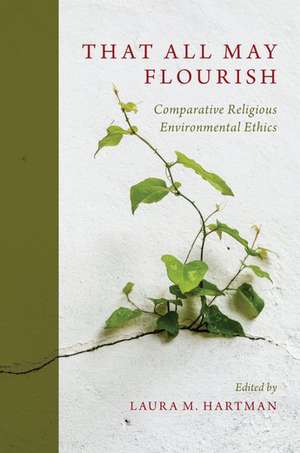That All May Flourish: Comparative Religious Environmental Ethics
Editat de Laura Hartmanen Limba Engleză Paperback – 12 iul 2018
| Toate formatele și edițiile | Preț | Express |
|---|---|---|
| Paperback (1) | 190.52 lei 10-16 zile | |
| Oxford University Press – 12 iul 2018 | 190.52 lei 10-16 zile | |
| Hardback (1) | 547.05 lei 31-37 zile | |
| Oxford University Press – 30 aug 2018 | 547.05 lei 31-37 zile |
Preț: 190.52 lei
Preț vechi: 246.36 lei
-23% Nou
Puncte Express: 286
Preț estimativ în valută:
36.47€ • 39.63$ • 30.65£
36.47€ • 39.63$ • 30.65£
Carte disponibilă
Livrare economică 20-26 martie
Preluare comenzi: 021 569.72.76
Specificații
ISBN-13: 9780190456030
ISBN-10: 0190456035
Pagini: 328
Dimensiuni: 155 x 231 x 20 mm
Greutate: 0.46 kg
Editura: Oxford University Press
Colecția OUP USA
Locul publicării:New York, United States
ISBN-10: 0190456035
Pagini: 328
Dimensiuni: 155 x 231 x 20 mm
Greutate: 0.46 kg
Editura: Oxford University Press
Colecția OUP USA
Locul publicării:New York, United States
Recenzii
[That All May Flourish] provides much to advancing interreligious, cross-cultural inquiry into better understanding the ways that human flourishing and ecological well-being are enmeshed.
This is a great text that challenges the dominant language of stewardship and the Anthropocene and offers the metaphor of flourishing instead. It will be a great supplemental text for courses on comparative religion, environmental ethics, and religion and nature. I appreciate that it includes both comparative approaches, but also a topic-centered approach. Furthermore, the case studies that many of the authors use to anchor their work will be valuable in the classroom!
With accessible chapters covering a range of academic disciplines and religious traditions, this book should be studied by scholars and educated lay readers of environmental ethics. Theologians and philosophers will find wisdom from the "flourishing" approach to environmental ethics, not only in their own traditions but in other religious traditions as well. Students will find the brief dialogue chapters an easy entry into key questions.
Overall, though, this book is challenging and impressive in scope, and it is far more successful than most edited volumes at creating insight and interest across its different discussions. The editor and the contributors are to be commended on their collective work on this project.
Written from a process of learned exchange across traditions, this book hosts a focused dialogue on something that matters for every living thing: what it means to flourish. Curated with originality and carefully written, this volume will be especially useful for teaching in courses on religion, on environmental studies, and on cultural dialogue.
Laura Hartman has done something extraordinary: she produced a volume on comparative religious ethics whose organization replicates the type of productive dialogue at the core of this enterprise. When you add that the chapters are written in an accessible and engaging style, and this is the first comparative religious ethics collection that focuses on the non-human world, it is a must read for all ethicists.
In this fascinating, timely, and suggestive collection, the contributors extend the concept of 'flourishing' beyond human-centered virtue ethics to the wider world of ecology and environmental ethics. As a work of comparative religious ethics, it exemplifies a novel and welcome approach to cross-cultural analysis: the chapters each combine specialist attention to particular cases in context, with ongoing constructive dialogue around important aspects of human, animal, and environmental flourishing.
This is a great text that challenges the dominant language of stewardship and the Anthropocene and offers the metaphor of flourishing instead. It will be a great supplemental text for courses on comparative religion, environmental ethics, and religion and nature. I appreciate that it includes both comparative approaches, but also a topic-centered approach. Furthermore, the case studies that many of the authors use to anchor their work will be valuable in the classroom!
With accessible chapters covering a range of academic disciplines and religious traditions, this book should be studied by scholars and educated lay readers of environmental ethics. Theologians and philosophers will find wisdom from the "flourishing" approach to environmental ethics, not only in their own traditions but in other religious traditions as well. Students will find the brief dialogue chapters an easy entry into key questions.
Overall, though, this book is challenging and impressive in scope, and it is far more successful than most edited volumes at creating insight and interest across its different discussions. The editor and the contributors are to be commended on their collective work on this project.
Written from a process of learned exchange across traditions, this book hosts a focused dialogue on something that matters for every living thing: what it means to flourish. Curated with originality and carefully written, this volume will be especially useful for teaching in courses on religion, on environmental studies, and on cultural dialogue.
Laura Hartman has done something extraordinary: she produced a volume on comparative religious ethics whose organization replicates the type of productive dialogue at the core of this enterprise. When you add that the chapters are written in an accessible and engaging style, and this is the first comparative religious ethics collection that focuses on the non-human world, it is a must read for all ethicists.
In this fascinating, timely, and suggestive collection, the contributors extend the concept of 'flourishing' beyond human-centered virtue ethics to the wider world of ecology and environmental ethics. As a work of comparative religious ethics, it exemplifies a novel and welcome approach to cross-cultural analysis: the chapters each combine specialist attention to particular cases in context, with ongoing constructive dialogue around important aspects of human, animal, and environmental flourishing.
Notă biografică
Laura M. Hartman blends her passions for religion and the environment in her work on consumption, climate engineering, ecological restoration, feminism, virtue, and other topics. She is author of The Christian Consumer: Living Faithfully in a Fragile World.
